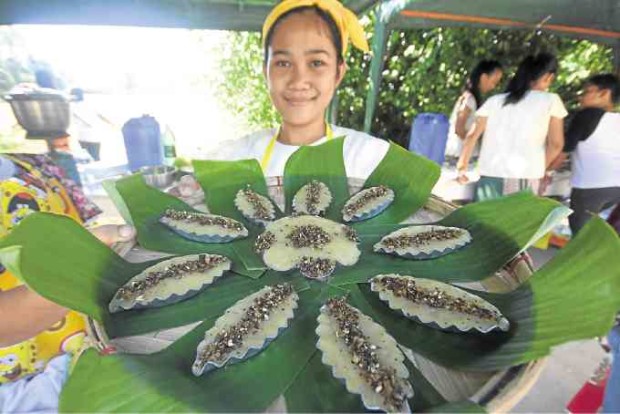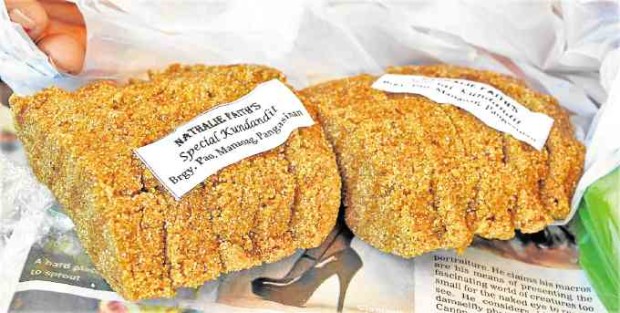Pangasinan’s ‘Kundandit’ vanishing, now a rare commodity
MANAOAG, PANGASINAN—“Kundandit,” a homemade delicacy produced only in this pilgrimage town, is fast disappearing from the display shelves of vendors’ stalls around Minor Basilica of Our Lady of the Rosary of Manaoag.
“There used to be a time when vendors at the foot of the church were all selling kundandit,” said Rafael Saygo, program director of the town’s Galicayo Festival, a two-week celebration held every first week of December in honor of the Virgin Mary.
“But now, it has become a very rare commodity,” he said, adding that there is only one person producing it now in the town. Kundandit is a rough, C-shaped mass of corn bran mixed with small amounts of cassava, banana and sticky rice. It is sold in five slices packed in a plastic bag, and best eaten dipped in hot coffee or chocolate.
No student awareness
“The truth is, our young people in the town now do not know what kundandit is. We did a survey among students and not one knew about the delicacy,” Saygo said.
Article continues after this advertisementKundandit began to vanish seven years ago after delicacies from neighboring towns, such as “tupig” (grilled powdered glutinous rice wrapped in banana leaves) of Mangaldan and Villasis, “puto” (steamed rice cake) of Calasiao, and “patupat” (sweet sticky rice wrapped in coconut leaves) of Pozorrubio, began to invade local stores, he said.
Article continues after this advertisementFast-food stalls have also mushroomed around the church, depriving kundandit vendors of potential buyers.

Manaoag students prepare “kundandit” in different shapes and sizes during a recent cookfest to revive interest in the delicacy. —WILLIE LOMIBAO
To prevent the delicacy from totally disappearing, Saygo included a kundandit cookfest in the Galicayo Festival. “This is our way of reviving a dying industry, which was an important part of our local culture,” he said
The competition, which was joined by high students from the town’s villages, sought to popularize kundandit and encourage people to improve the delicacy.
Appeal to millennials
“We want them to produce a kundandit that will appeal to the millennials, not only in terms of taste but also its appearance,” Saygo said.
Aside from its basic ingredients, the students were given freedom to choose what other ingredients they wanted to add to give kundandit a “twist.”
“Our chemist is now also studying how to improve the shelf life of the kundandit. Right now, it can only last for two days,” Saygo said.
Kundandit is healthy because of its high fiber content, said Leah Aquino, former nutrition officer of Dagupan City.
If “puto bumbong” and “bibingka” became the famous fares after every Simbang Gabi (dawn masses) in other towns and cities, Saygo said, kundandit was the most sought-after food in this town.
